#and his faith will protect him
Text
drowned god the weak little beast you put on this earth to write fanfiction and like greyjoys has been neglecting homework in order to reread the affc ironborn chapters and have way too many opinions about the soggiest man in the world. i have Had Some Thoughts on aeron, theon, and names
it really is striking to me just how little people refer to aeron by his name. not just in conversation, but in the narrative itself, with the most notable example of this being aeron himself in his pov chapters constantly thinking of himself not as aeron but as damphair or just The Priest. he refers to himself as damphair or The Priest instead of aeron like twenty times throughout the prophet, to the point where it's used almost as frequently as his actual name. in the drowned man it's only like eight times (which i think is mostly because the vast majority of this chapter is given over to the kingsmoot, where aeron is mostly a spectator and the narrative focus is on the events taking place rather than his reaction to them). in the forsaken, it's ten times, though while aeron is actively imprisoned he mostly thinks of himself as aeron, with damphair being used four times in flashbacks to events that took place in the past, once during a conversation with euron while aeron is defying him, and then three times after he is freed and he can see the sea again
the consistency and frequency of aeron in his own mind thinking of himself as something other than his name reads to me almost like a foil to theon and reek. the identity of the damphair allows aeron to dissociate himself from the burden of his past weaknesses and sins: his pre-drowning frivolity and alcoholism and euron's sexual abuse. for aeron, being damphair is as empowering as being reek is degrading for theon. he is constantly affirming to himself that he is a loyal servant of the drowned god and that this makes him strong. it gives him status and purpose he never had as aeron the boy, who was the youngest and weakest of his brothers. aeron-the-priest cannot be frightened by any mortal man any more than he can be frightened by the dark or by memories. kill the boy to become the man -> drown the boy to become the damphair
(although, of course, when aeron tells himself all this about how god chose him and it makes him strong and special and immune to fear, he is deluding himself. the damphair is haunted incessantly by his brothers. aeron has the tendency to reconcile his lasting fear of euron with his special god-given immunity to such mortal flaws as feeling fear by believing that euron is ungodly/an avatar of the storm god/literally the devil, and therefore not really a mortal man in the same way that balon and victarion are
which is a really interesting parallel to how euron must see himself, what with the whole apotheosis god-king thing he's got going on by twow. in a way, euron is aeron's real god. it is euron's abuse that first connected aeron with faith, and it is faith that aeron uses to cope with and overcome the lasting psychological scars of that abuse and urri's death. aeron doesn't think of euron as a mere flesh and blood human being anymore. he's mythologized the crow's eye in his own mind: euron is not just his abuser, he's a boogeyman, a devil, quite literally the thing that goes bump in the night. and euron knows this, and delights in knowing it and in taking every chance he can to tear down aeron's faith and replace the drowned god with himself as the backbone of aeron's life. which he does not actually succeed in doing, as of the forsaken! aeron keeps his faith like theon keeps his name. it cannot be taken from them)
reek, meanwhile, is not an identity that theon chooses to assume to cope with his trauma. it is forced upon him in the middle of the trauma and he has no choice but to accept it for his own self-preservation. ramsay devastates theon physically: flaying him, starving him, beating him, removing his fingers and toes and teeth and genitals. imprisonment and violence are the tools he uses to take away theon's physical strength to resist him, but reek is how he gets to all the parts of theon that can't be bruised or cut. it's the psychological equivalent of a flaying knife. reek is the weapon he uses to attack theon's identity and sense of self and personhood. though it's important to me to note that those were things theon was already struggling with well before ramsay came on the scene, and that he has an absolutely unbelievably strong will that allows him to retain a degree of his original personality under ramsay and regain his own name later in adwd even after enduring all the torture and abuse. he is a greyjoy of pyke. his name is theon, and if he dies, he will die as theon, not as reek. when he leans into being reek, it is as a means of self-preservation and protection from harm. he basically says as much to jeyne when he tells her to be arya: he believes that serving ramsay and capitulating to his whim is the best way to stay safe. you have to know your name.
ultimately, theon is as relieved to be rid of the name reek as aeron is relieved to see the ocean again at the end of the forsaken. theon's name is a source of pride to him, something that he clings to after he has lost everything else, something that will always be his even after all that has been taken away from him. aeron's name is a source of shame, something that he is reduced to when he feels weak, something that he reverts to when he is powerless at the mercy of his abuser
#aeron greyjoy#theon greyjoy#house greyjoy#analysis#it makes me wonder actually at what point euron stopped assaulting aeron#from what i can see there's no textual evidence that it goes on until aeron's a teenager/young adult but also no evidence that it doesn't#it would be interesting if it stopped entirely after aeron was drowned#further supporting aeron's belief that as a devoted man of god he is now untouchable even by euron#and his faith will protect him#because it has to. because it must. because after balon dies it is all he has left#when the forsaken hits and what aeron wants is for his big brother victarion to come save him...#and it can't happen because victarion is gone and hope is gone with him#hoping against hope that your big sibling will come and save you#the theon-aeron paras are lelling at a dangerous rate#i've got more aeron meta and aeron-theon thoughts cooking in my sick little brain but we're not ready for that#op#religion#meta
86 notes
·
View notes
Text
today in more zolu thoughts: yet another thing I find fascinating about zoro and luffy's relationship, which I believe the LA managed to capture pretty well despite the differences between it and the og source material, is that while zoro's capacity for loyalty and devotion where luffy's concerned are insane (the all-encompassing, heartfelt, lay down my life and dreams for you, follow you until death or the very end of everything kind of crazy), they're not entirely unconditional per se. the condition here being that he has to measure up to zoro's standards - that luffy has to prove himself a man worthy of following.
there are plenty examples of this in the manga, but I'll stick to where it and opla intersect. so manga!zoro pretty much stands firm with this condition when he agrees to follow luffy, warning him about not getting in the way of zoro's dream right away. opla zoro is a lot more reluctant to join in comparison, and he just seemingly goes along with the whole thing in a more "might as well" manner; even so, there's these few subtle moments where you can see him being struck awe by luffy's faith in himself/his dream (the dinner at kaya's) and showing exactly why he's a "different" kind of pirate (ie freeing the folks from orange town).
still, the most pivotal moment is zoro's fight with mihawk in both cases. this is where luffy has to really prove himself to zoro, for the first time. because talk of dreams and promises and not hindering them is nice and all, but can luffy really stand by what he says when push comes to shove? when the life of someone he cares about is on the line? and man. the answer is yes.
in the manga, by stopping johnny and yosaku from intervening and refusing to do so himself as well, even though he was deeply upset by zoro getting hurt, luffy proved he wouldn't go back on his word nor betray zoro's trust and the faith he had placed in him. in a similar fashion, opla luffy letting zoro go ahead with the duel despite his own apprehension/doubts and nami questioning both of their choices, is what finally led to zoro recognizing him as his captain out loud and accepting his role as a first mate.
I just think it's interesting that these two kind of make each other walk on a tightrope. only the world's greatest swordsman can stand by the pirate king's side. the pirate king can have the world's greatest swordsman by his side, if he proves himself worthy of it. but the best part? for me, it's that zoro and luffy are able to challenge one another this way (or set the bar that high) because they absolutely believe the other can rise up to it and beyond.
#zolu#one piece#opla#tp#I should be packing bc i'm traveling early tomorrow but alas#the zolu thoughts are all consuming and won't leave me alone#I just. dig it bad. I adore that zoro's willing to place all that loyalty devotion love onto luffy as long as he finds him deserving of it#and luffy's on a constant journey of convincing zoro that he is; even if that means that he will sometimes be put into difficult positions#or make difficult choices#how crazy is that. the never ending back and forth of#'do you deserve my everything?' 'yes I do and I'm willing to prove it to you for the rest of our lives'#like zoro really drives himself so hard to become the best; aside from his promise to kuina; for luffy's sake#he wants to be worthy of luffy's faith too and protect the man he's sworn his everything to along the way#eating my entire fist btw#love them
292 notes
·
View notes
Text
ROTTMNT Theory: Donatello's Hidden Role
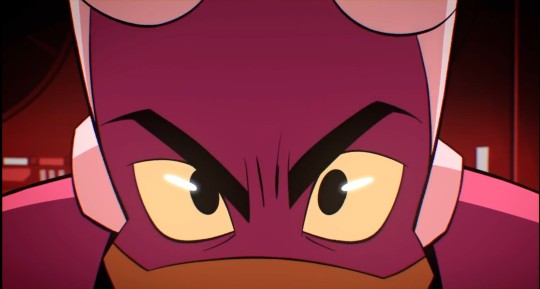
After rewatching ROTTMNT (shorts and movie included), I realized something about Donnie's character that I've hardly seen anyone mention, and I'm going to talk about it in depth here.
I'll assume you've already watched the series and dive right in, but spoiler warning under the cut in case you care about that.
Let me start with something seemingly off topic. Raph is the oldest of the four brothers, which landed him the responsibility of keeping his younger siblings safe when their father was unavailable. (Not trying to bash Splinter. He's gradually grown to be a better parent later on, but you can't deny he was fairly neglectful in the beginning of the series)
The constant pressure Raph went through was brought up in the episode "Anatawa Hitorijanai", and then the movie showed he still struggles with it now.

He's constantly shouldering the burden of being their family's sole protector, but is this the truth? What if I told you there are actually two protectors in the family? And that the other one was Donnie all along?
When you look closely, Donnie is surprisingly protective of his loved ones. I did a tally of how often each brother exhibits what could be protective behavior, and Donnie was in second place (29) after Raph (35). Some of these choices are debatable, but here's a bunch of examples as pictures.
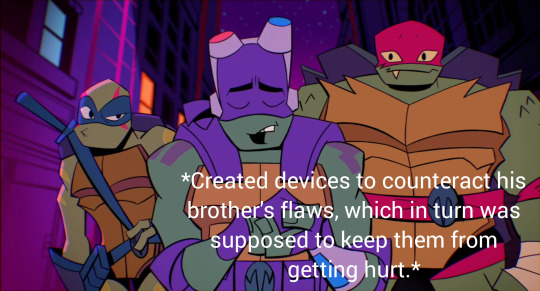
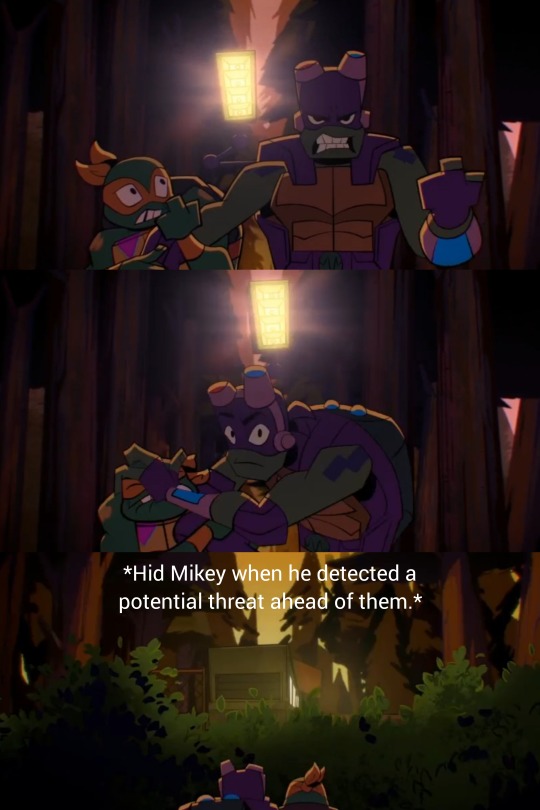
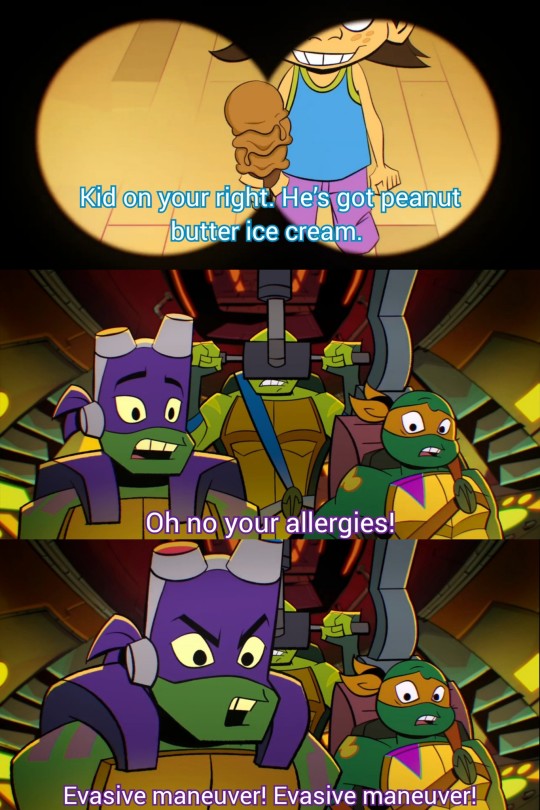


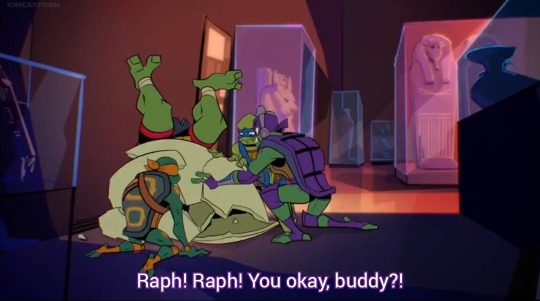
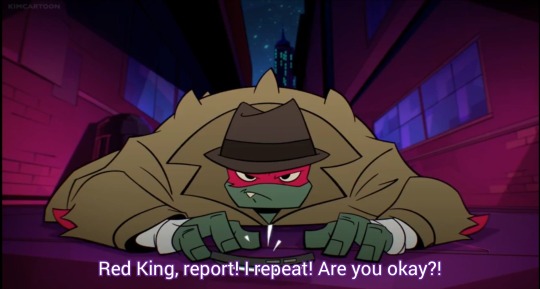
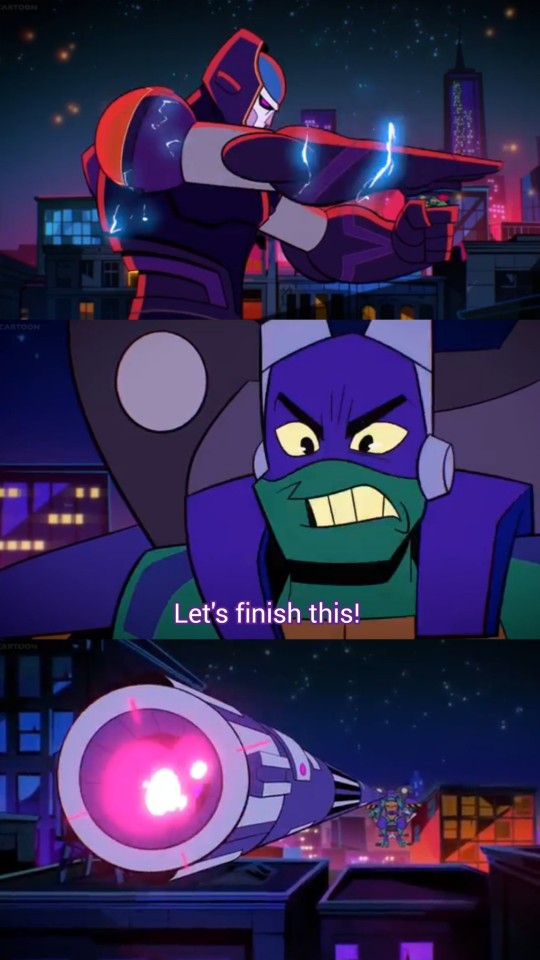
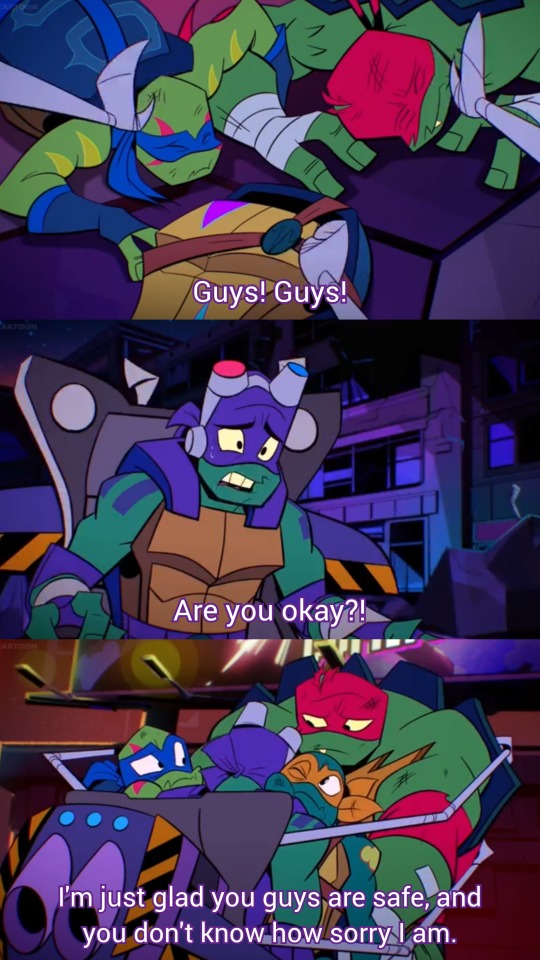




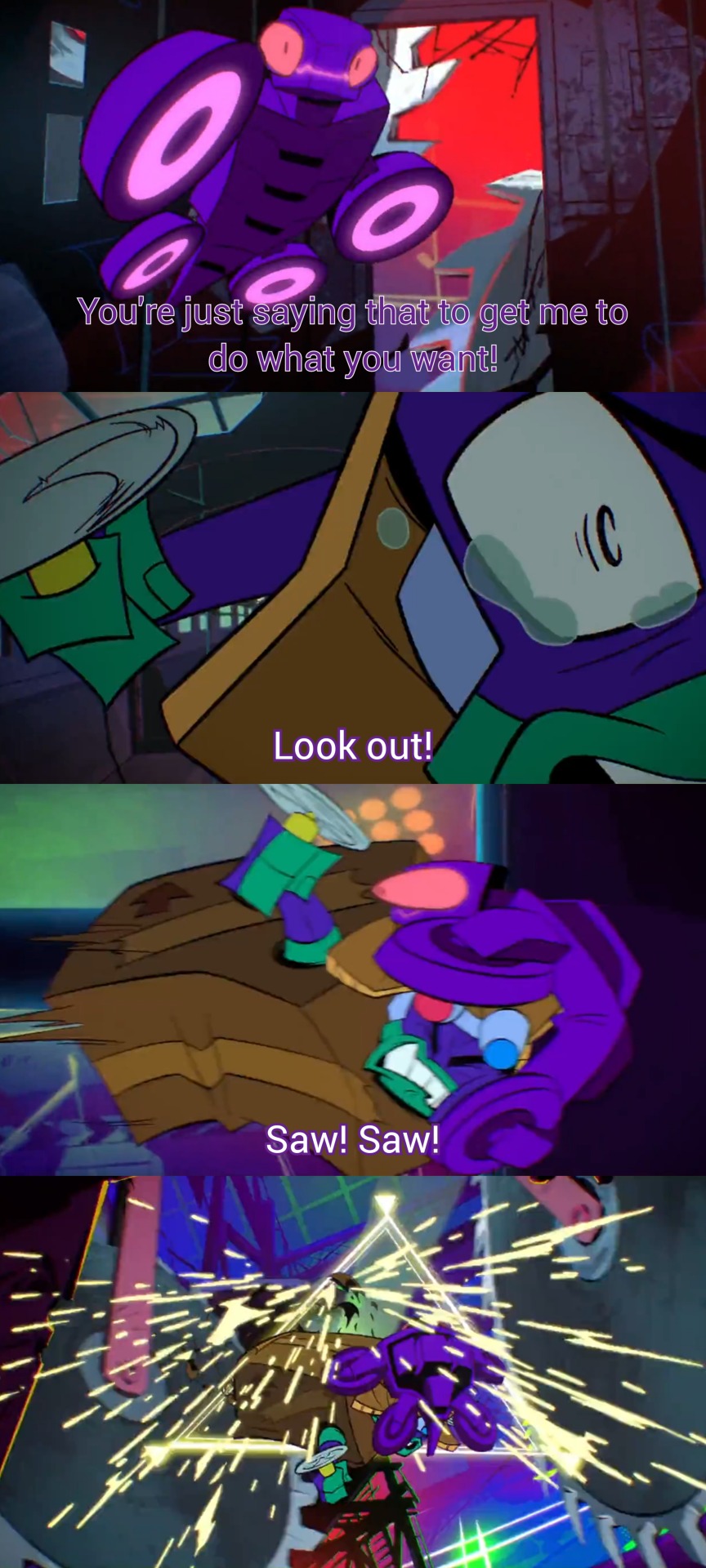
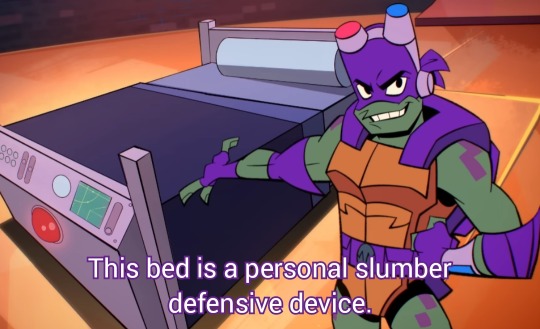

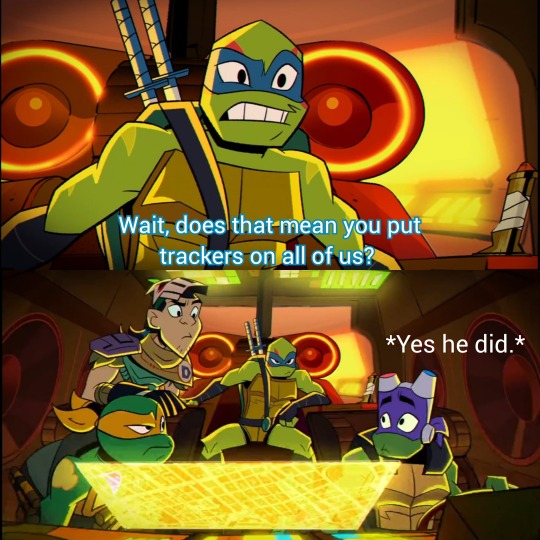

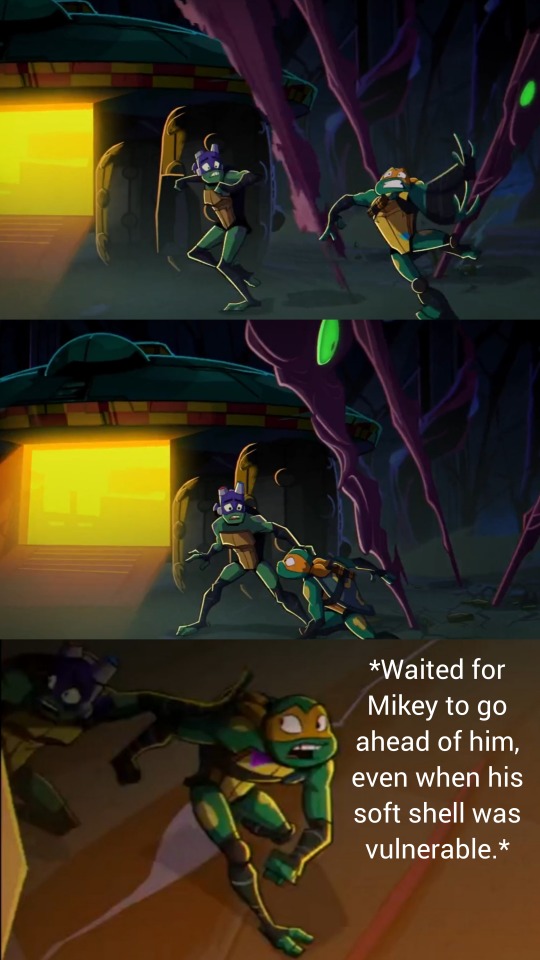

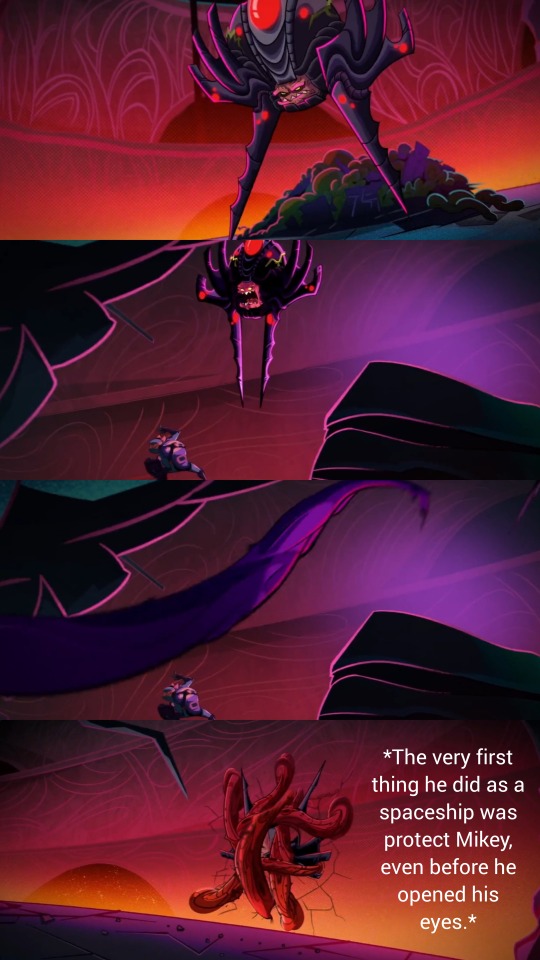
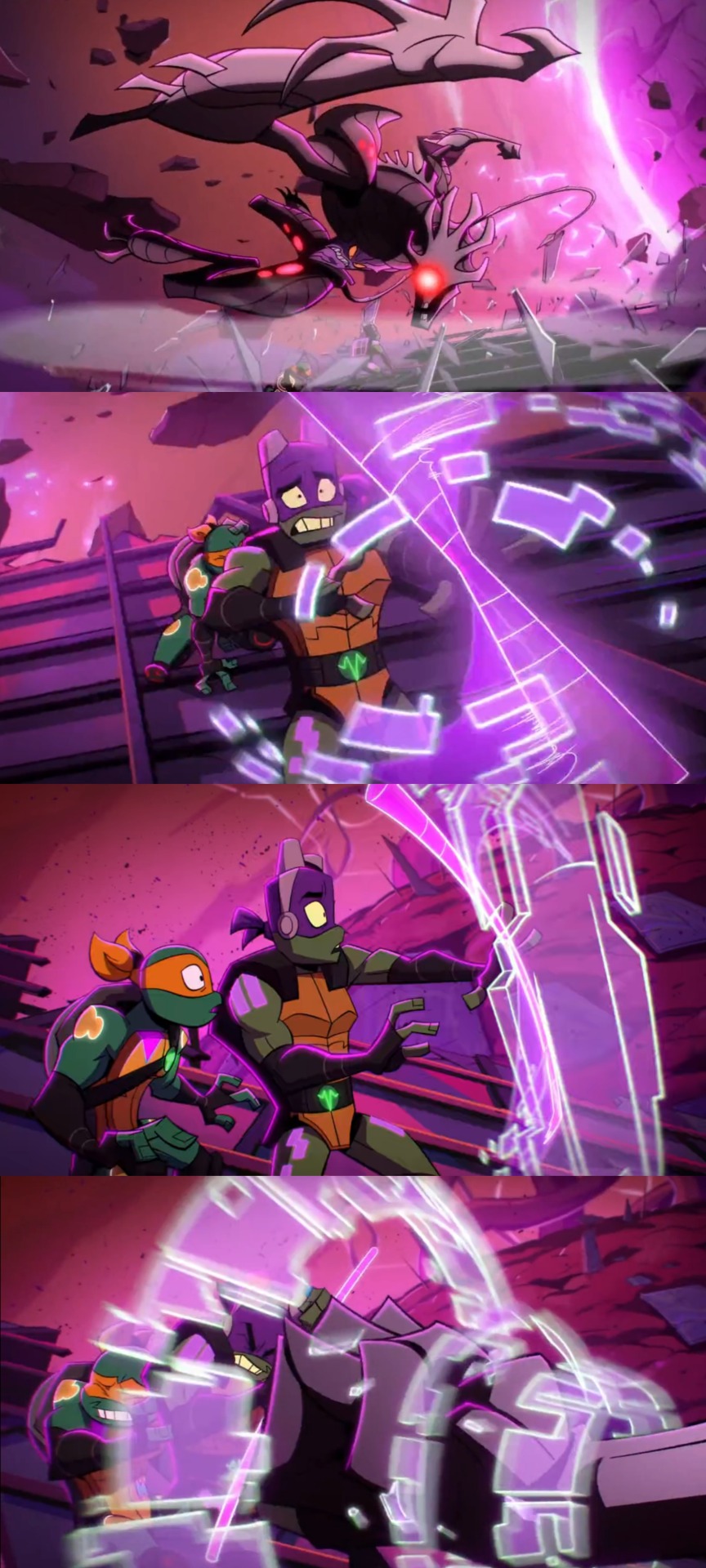


Would you believe me if I told you I still have a couple smaller examples I had to leave out due to the picture limit? And that's not even including the few moments where Donnie and Raph ever-so-subtly parallel each other.
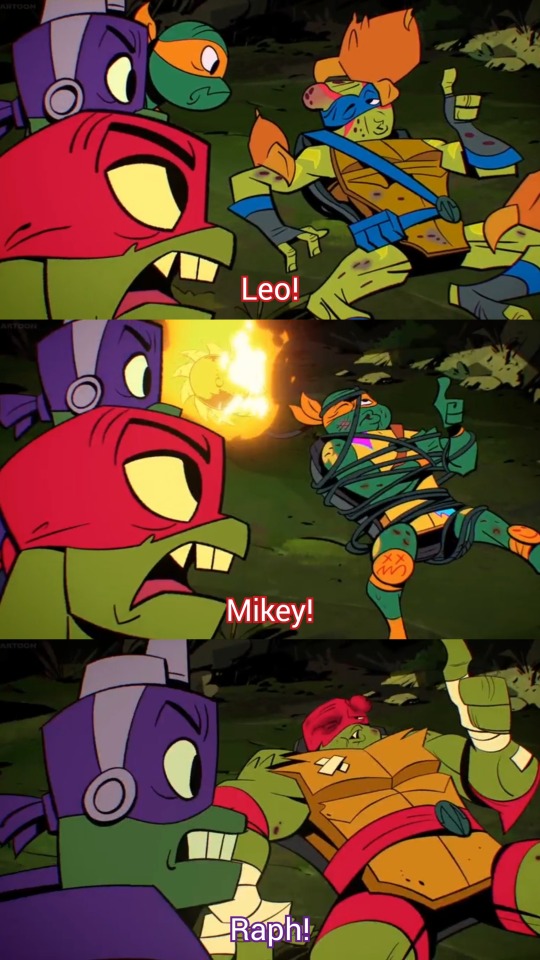
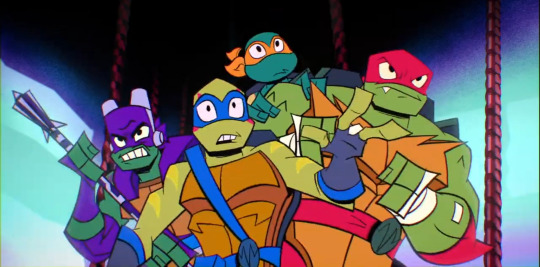
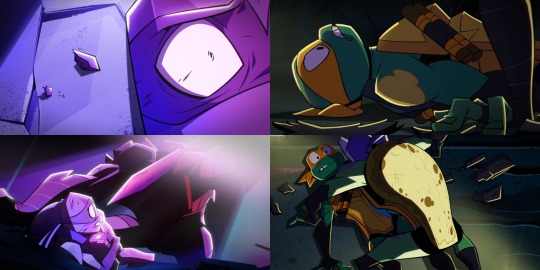
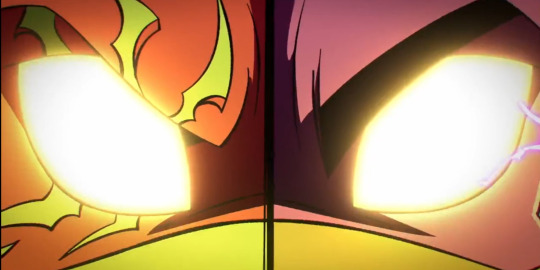
All things considered, Donnie and Raph aren't so different. Raph is the primary protector who faces the threats head-on with his physical strength, while Donnie is the secondary protector who tends to use more distant methods with his tech and wit. However, when push comes to shove, Donnie will also step up to take direct action when he deems it necessary.
They may be the brains and the brawn, but they both use their respective skills to defend and support their family.
#analysis#rise donnie#rottmnt#Donatello#Raphael#Sorry in advanced if the pictures have trouble loading#But seriously#I would love to see more of Donnie and Raph's dynamic if we get season 3!#Interestingly enough Donnie seems to be the least outwardly protective of Leo#Maybe the sibling rivalry makes him too prideful to show it as much#even though we know his protective instincts definitely extend to Leo as well#Alternatively there are a couple clues pointing toward Donnie seeing Leo as intelligent#so maybe he has a little faith in that?#The disaster twins are complex to say the least#I actually have quite a few extra examples I could share#but some of them are more debatable than others#I changed the tag from 'theory' to 'analysis' but I'm keeping the title the same
2K notes
·
View notes
Text
a small detail but
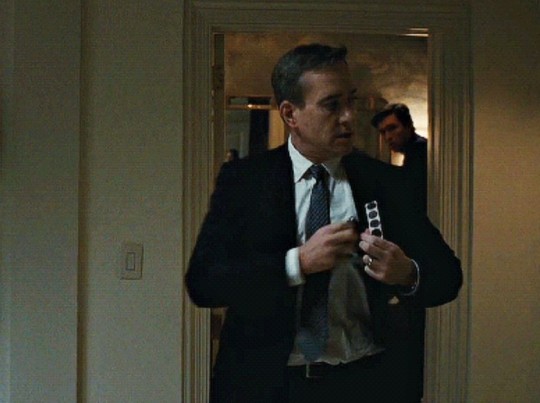

i think it's cute how after their bathroom fight is over they're last seen with their stickers in hand. tom was holding tight to them the whole time— greg, at some point in the slapping session, let them fall, but he picks them right up again. stares at it. oh the symbolism.
#tomgreg#idc if it was a continuity error#im reading it as a representation of greg losing his faith on tom for a moment there#giving up to the fear of the uncertain future even though tom said he'd take care of him#but eventually he goes back on trusting tom to protect him because that's what hes been doing this whole time isnt it.#and tom holding the stickers the whole time#oh my god#doesnt matter if greg fucked it up#doesnt matter that greg just slapped him hard for the first time#he's not letting go of greg. that wasn't even an option.#hes not giving up on greg. not now#not ever
154 notes
·
View notes
Text
we all talk about how cool it is that Kallus is part of a Lasat prophecy (because it obviously is), but I feel that no one talks about the objectively hilarious fact that Hondo is also part of that prophecy
#I mean#imagine the Ashla Bendu and Bogan just chilling out as gods do#Ashla: oh yeah for the child I’ve picked a man whose lost his faith because he feels so guilty for his perceived failure#lira san will ease his heart and take some of his burden#For the warrior I’ve chosen a broken man who only wanted to protect and who’s terrified of his mounting failures#Lira san will help bring him to the light so he can see the error of his ways and foster a true family to protect#The bogan (high as fuck): yeah and the fool will be this random washed up pirate who refuses to die. He doesn’t even know what Lira san in#AND THEN THEY JUST ROLL WITH IT?#Y’all just KNOW hondos trying to find a way to monetize this#star wars rebels#swr#sw rebels#star wars#agent kallus#alexsandr kallus#zeb orrelios#garazeb orrelios#hondo ohnaka#Lasat theology
97 notes
·
View notes
Text
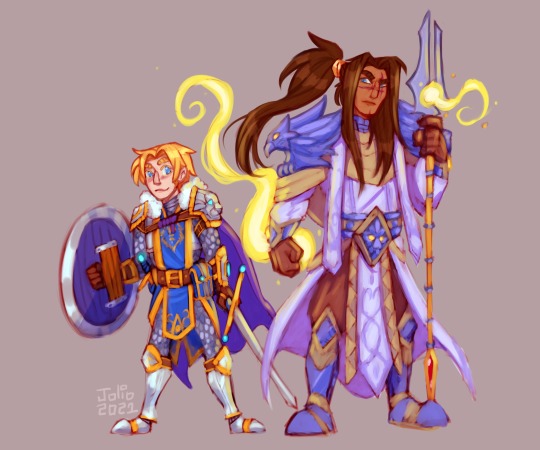
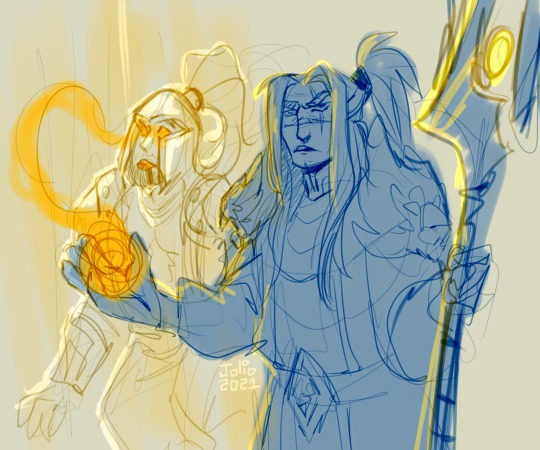
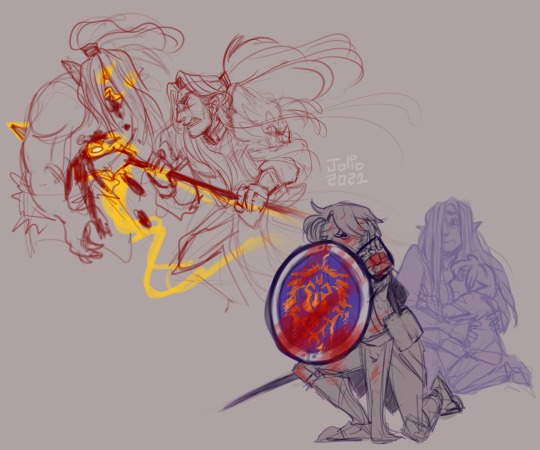
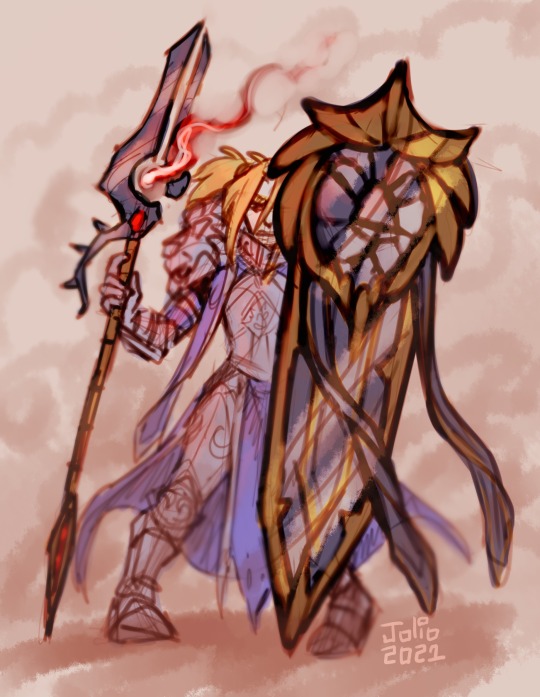
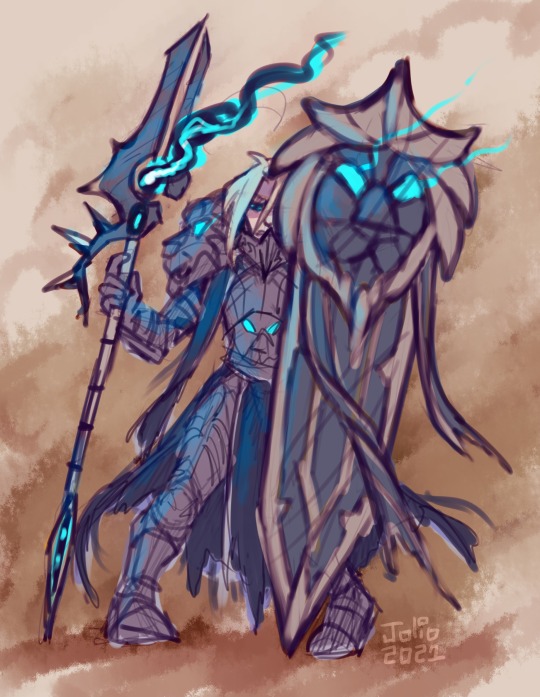
2021 Wrynn class swap
#world of warcraft#anduin wrynn#varian wrynn#warcraft#Protection Warrior Anduin and Discipline Priest Varian#Varians not as dedicated to the church as many believe he should be#his faith is not in the Light's judgement but in it's power.#Anduin#meanwhile#notices how the light heals only after one has suffered. Why not attempt to prevent the suffering altogether?#Shalamayne is a staff that can be used as a spear i guess idunno#Anduin never lets it show how heavy the shields he carries are to him. He is king he must defend his army and hold position.#Besides#there is nothing heavier to him then the crown. If he can carry that he can carry anything#so he claims
129 notes
·
View notes
Text

good omens reference and also, halsin is HUGE ok, in game, rene literally only comes up to his shoulder
im assuming body type 2 for drow are around 6ft but i dont think(?) they are(?) HOWEVER. elves are canonically on average 6ft tall, and halsin is considered abnormally tall for an elf, which can only mean he's 7ft at least, in this essay i--
#halsin bg3#baldur's gate 3#halsin#bg3#oc art#halsin x tav#(technically. even though rene's an existing oc)#digital art#doodles#ocs#rene isn't cheating with alois in our runs btw crow and i decided that alois (or rene in crow's case) is dead#and their story is essentially them trying to cope with the aftermath#alois never really moves on. he ends up including rene in his prayers to his god (alois is a paladin) and kinda. ascends rene's spirit#rene meanwhile isn't that spiritual although he does sorta convert to alois's faith in the sense that he prays to rao#with the hopes that alois will hear his prayers too and speak to him or at least listen to him#he's wracked with survivor's guilt#the rene/halsin romance is very sweet though bc they're two old elves who both outlived the people they loved deeply#alois visits halsin later in his dreams and gives him his blessing ('make rene happy and protect him because i can't do it anymore')#and halsin is more than happy with that he's glad to have alois's permission to care for rene#rene's upset though bc alois has never spoken to *him* before#(for good reason. if alois did speak to rene he'd never move on)#this is like just a fraction of the lore though i have a LOT going on#and i havent even hit act 3 yet#i cant wait for the bear cutscene im gonna try all the possible endings#save scum win <3#also their dynamic has very much 'small black cat hisses at great dane' energy
117 notes
·
View notes
Photo
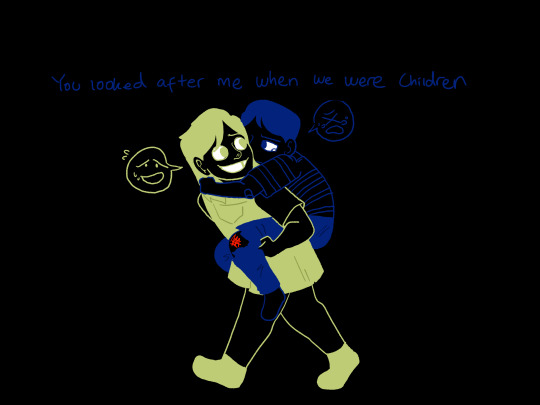
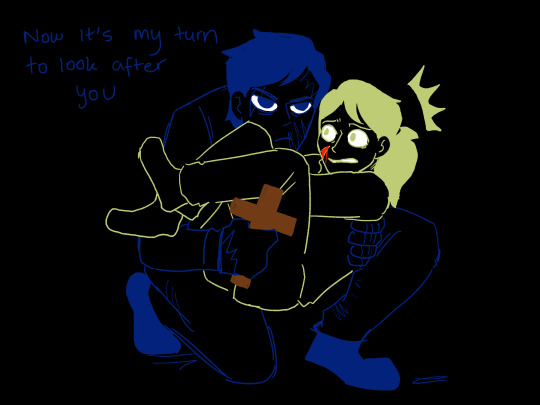
More John and Lisa friendship dynamic doodle I did while doing one of my midterms!
Ending where they run away together :)
#faith game#faith the unholy trinity#faith fanart#john ward#lisa pearson#fanart#drawing#doodles#digital art#art#((I love these two sm y'all have no idea <3))#((A lot of people liked the previous JohnLisa friendship dynamic headcanon so here's one!))#((John doesn't like being touched by anyone except Lisa. And he likes physical contact with her alot))#((Lisa used to carry and pull John everywhere she went like a teddy bear when they were kids))#((When John got Bigger he uses his Big Boy privelege to do the same thing with Lisa when they decided to run away together))#((You'd find him holding onto her or even hoisting her up with one hand with his cross on the other whenever something startles him))#((It's not that Lisa doesn't appreciate this new protective side. She just kept getting motion sickness whenever he carries her like a sack)
183 notes
·
View notes
Text
I'm kinda curious about the period of time when Minato was Hokage, because there's so much you could say about Konoha depending on it. It could be that I don't remember what the manga says about it too, but anyway.
We know that before Minato was Hokage, the discrimination towards jinchuurikis was high. We know it from Kushina's story. After Minato, the jinchuurikis discrimination was not exactly as bad as it could have been (and the bar is soooo low) in physical terms, but the level of sheer isolation was ridiculous. Sure, Kushina had guards and she lived in a tower with a perimeter drawn around it, one that she couldn't surpass. The difference is that Kushina knew why she was being isolated, there was someone willing to teach her about it right from the start, a family member even if distant, someone with the same experience.
All Naruto knew is that he was unwanted. He had no family, no one was willing to guide him. No, not even Iruka. I'm talking about before in the manga, before Iruka realized how much Naruto needed him and did something about it.
If that was before and after, how was it during the time Minato was Hokage?
Did Minato push for Kushina to become Hokage? Was the idea rejected? Did he get angry? It was her dream after all. Or did they realize it would be impossible so they pushed Minato to go for it? Were they sad about the idea of Kushina having to live her dream through Minato, because they wouldn't let her go for it? When did Kushina give up and change her goal in life?
Did Minato tell anyone about his plan on how to get rid of the jinchuuriki discrimination? Did he talk about it with Kushina? We know that they planned Naruto's birth and tried to make it as safe as possible. When the time to seal Kurama within Naruto came, they both knew how Konoha would treat Naruto. Minato wanted Naruto to be viewed as the son of a hero, but his wishes were thrown aside as soon as his body was cold enough.
With no law to protect the jinchuuriki of the kyubi, I wonder how bold the people of Konoha were in their discrimination against Kushina while Minato was Hokage. Times were different, Minato was highly respected and feared, but how many times did he have to tell someone to mind their words? How many times did he catch Kushina avoiding a certain restaurant or a street? Did he ever feel a slight of resentment against his home for the way they treated his wife? His pregnant wife?
Were there rumors of the child being a monster for being the son of a jinchuuriki? It could be that some Konoha parents telling their kids to not play with the little Uzumaki/Namikaze was a thing before Naruto was even born?
From what I've seen, Konoha has no gentleness for kids of prestigious lineages. Being a child of a powerful shinobi makes your life worse, in fact. A million times over: it happened to Sasuke, to Neji, it happened to Kakashi in the generation before them, it happened to Itachi in the in-between.
I don't think that being the son of the hokage would have saved Naruto for being mistreated by the village. Not when his mother was a jinchuuriki.
It just makes me wonder, you know?
In the time he had, how did Minato try to change things to protect his family?
Was it a matter of needing more time? Or there wasn't a plan at all?
#I've realized this reads as if I'm harshly criticizing Minato#as always the problem is not within the character but the plot holes in the story itself#Kishimoto clearly presents Minato as a man who loves his family but not always does the best for them#he struggles balancing his duty to konoha and his role as a father and a husband#it is a fact that he failed to protect Naruto#but the lack on information about his time as a hokage makes it seems like he waa failing his family before Naruto was even born#it contradicts what we saw of him in the newest Naruto one-shot#he created the rasengan to protect Kushina and help her be free and safe#he reacued her when she was kidnapped#he stood up for her#they seemed to love each other deeply and Kushina had the temper to chase after him if she thought he was avoiding her for example#sealing kurama within naruto was really bad but in the end he had little time and there were on a big crisis#I wonder what type of pressure was put on him while he was Hokage#even when he was really smart and dangerous and whatever he still was young#he failed his genin team too#I'm sorry but all those pieces are not in Minato's favor#which makes him a great character for being complex and compelling#but anyway#maybe I am criticizing Minato but not in bad faith okay?#minato namikaze#kushina uzumaki#naruto uzumaki#naruto#naruto shippuden#naruto classic
19 notes
·
View notes
Text
The Shocking Redemption Arc of Chester Arthur
To my great pleasure, I get to tell you about Chester A. Arthur. If you don’t know his story, that’s a surprising statement, because most people don’t even recognize his name as one of the presidents. That’s a crying shame, because this guy has the most fascinating character arc of any president I’ve come across so far. He entered the presidency as a despicable, corrupt, conniving political lackey, and left it as--
Well, I’d best get on with the story.
Chester Arthur started out as an idealist. He was the son of an abolitionist Baptist minister, and though he dropped the religion in adulthood, he remained devoted to abolishing slavery. He became a lawyer with a New York firm that argued several civil rights case, and he rose to fame in 1854 when he served as the defense attorney for Elizabeth Jennings, the Northern version of Rosa Parks. Arthur’s victory in her case led to the desegregation of New York City’s public transportation.
During the Civil War, Arthur got an appointment as New York’s quartermaster general. After the war, Arthur returned to civilian life and became a Republican “party man” who worked behind the scenes to draw in voters, funding, and supporters. He and his wife Ellen (called Nell) both loved the finer things in life, which drove Arthur to do whatever he could to gain fame, wealth, and social status.
This is where I need to explain the spoils system. For the first hundred-plus years of American politics, all federal positions were filled by appointment. When a new president came into office, he could award government positions to his supporters--"to the victor go the spoils". Federal employees were required to donate money to the ruling party. There were no requirements for education or relevant experience. Any job could be filled by anyone with the right connections. If you think that sounds like a breeding ground for corruption and cronyism, you’d be absolutely right. By the 1870s, the system was getting extremely corrupt, and there was a growing push for reform.
But not by Chester Arthur. He owed his career to the spoils system. Through his work in the party, he became the right-hand man of Roscoe Conkling, New York’s senior senator and the state’s “political boss”. Conkling was a flamboyant showman, a magnetic politician, and a ruthless man. He had been a major supporter of Ulysses S. Grant’s presidential campaign, so Grant gave Conkling control over all the federal appointments in New York. Conkling used his power to fill positions with his friends and supporters, and he was brutal in attacking anyone who got in his way.
Because Chester Arthur was Conkling’s most loyal supporter, he got the best federal job in the country—Controller of the Port of New York. Before income tax, around 60-70% of federal funds came from the tariffs at this one port. The controller got a salary similar to the president’s, plus he was able to take a percentage of all the fines they levied. At the height of his power, Chester Arthur made $50,000 a year, which is a lot when the average skilled worker at the time made $500. (A rough estimate puts his salary at $1.3 million in today’s dollars.)
Arthur was living the high life. He racked up huge tailor bills. He had a gorgeously furnished house. His job allowed him to force his employees to donate a percentage of their salary to the Republican Party, which gave him even more power within the political machine. He bought huge amounts of wine and cigars that he handed out to people he was wining and dining for the good of the party. His wife resented that he was rarely home because of his political work, but Arthur loved the machine too much to stop.
After his 1876 election, President Rutherford B. Hayes desperately tried to reform the spoils system, but was blocked every step of the way by Roscoe Conkling. Finally, in 1878, Hayes managed to remove Arthur from his position as port controller, under suspicion of corruption, which allowed Arthur to spend more time working for New York’s political machine.
In January of 1880, Arthur was in Albany working for a political campaign when his wife caught pneumonia. By the time Arthur got home, Nell had fallen into a coma, and he wasn’t able to speak with her before she died. He felt guilty over her death, and especially the lack of closure caused by his devotion to politics. But instead of changing his ways, Arthur moved in with Conkling and became more devoted to politics than ever.
Which brings us to the 1880 Republican Convention. The Republican Party was split between two warring factions—the Stalwarts like Conkling who wanted to keep things the way they were, and the Half-Breeds who wanted civil service reform. President Hayes refused to seek re-election (partly because Conkling had made his life miserable) so these two factions somehow had to agree on a new candidate. Conkling supported a third term for Ulysses S. Grant. The Half-Breeds supported James G. Blaine of Maine—who happened to be Conkling’s mortal enemy.
James Garfield was there to nominate John Sherman—the Secretary of the Treasury and the younger brother of the famous Civil War general—and I can’t go any further in this story before I tell you a little bit about him. James Garfield is one of the most ridiculous overachievers in the realm of American politics. He was born into a dirt-poor farming family (he’s the last president ever to have been born in a log cabin). At sixteen, he left home to work on a canal boat, but quit after he nearly drowned, and his mother and brother scraped up enough money for him to go to school. His first year, he paid for his tuition by working as a school janitor. His second year, the school hired him to teach six classes (while he was still a student!) and then added two more because of how popular he was. By the time he was twenty-six, he was president of that same school. He became a lawyer and was elected to Ohio’s state legislature. During the Civil War, he became the youngest person to earn the rank of general. While fighting in the Civil War, his friends put his name in as a candidate for the US House of Representatives, and Garfield won even though he refused to campaign. He then served several terms in the House, where he became popular, but he refused to seek the presidency, because he’d watched several friends become warped by their presidential ambitions.
At the 1880 Republican Convention, Garfield was the more popular Ohio candidate, but insisted he was there only to nominate Sherman. At one point in his nominating speech, Garfield asked the audience, “Now, gentleman, what do we want?” To Garfield’s horror, one man shouted, “We want Garfield!”
Garfield remained loyal in nominating Sherman, but the spark had been lit. The voting went round after round after round for two days, with the votes being split between Grant, Blaine, and Sherman, with no one getting enough to win the nomination. Garfield got one vote in the third round. In the thirty-fourth round, Garfield suddenly got seventeen votes. Garfield stood to protest, saying no one had a right to vote for him since he hadn't consented, but the president of the convention--who was secretly thrilled because he liked Garfield more than any of the other candidates--told Garfield to sit down.
By the thirty-sixth vote, Garfield had won the nomination.
Now they had to choose a vice president. Several of the delegates got the idea to throw a bone to Roscoe Conkling. He was furious that Grant had lost the nomination, and he was vindictive. Conkling controlled New York’s political machine, so without him, the Republicans would lose New York, and without New York, they’d lose the election. He had to be placated. So the delegates nominated Chester Arthur, his right-hand man, as vice president.
Conkling told Arthur to refuse the nomination, but Arthur accepted, saying it was a greater honor than he had ever hoped to achieve. That's putting it mildly. The only position he’d ever held was port controller, and he’d been removed from that. Plenty of people thought nominating him was a horrible idea—a man like Chester Arthur only one step away from the presidency? But other people thought it was a shrewd political move—it would placate Conkling’s faction of the party, and Garfield was young and healthy and would rule in a time of peace. It wasn’t like there was any chance he’d die in office.
After Garfield was elected, Arthur immediately started causing problems. He all but openly boasted of buying votes in the election—which was not a great look when it had been a close race. He was completely on Conkling’s side in his war against Garfield. After Garfield appointed Levi Morton, a Stalwart, as Secretary of the Navy, Conkling sent Arthur and another lackey to drag Morton out of his sickbed--forcing him to drink a bracing mixture of quinine and brandy--and bring him to Conkling’s house to get chewed out, which caused Morton to resign. Conkling forced another Stalwart Cabinet nominee to resign on inauguration day.
Then Conkling went to war over the federal appointments. At first, Garfield placated him, appointing several of Conkling’s candidates. But then Garfield nominated Judge Robertson as Port Controller of New York Harbor. Conkling was livid. That was the prime federal position, a major source of Conkling’s power in the party, and Robertson was one of Conkling’s political enemies. In Conkling’s mind, Garfield had stabbed him in the back. Arthur agreed, and openly bad-mouthed the president to the press.
Conkling and the other New York senator resigned their Senate seats in protest—a dramatic political move. In those days, state legislatures voted for senators, and Conkling believed that since he controlled so many New York politicians, they’d easily get re-elected to their old seats. Unfortunately, the legislature was sick of being under Conkling’s thumb. The election became a drawn-out battle, and Chester Arthur went to Albany to help Conkling in his campaign.
While he was there, the unthinkable happened. On July 2, 1881, James Garfield was shot at a train station by Charles Guiteau, an insane office-seeker. Guiteau had come to the White House every day for months seeking an appointment under the spoils system. When that failed, he decided God wanted him to get Garfield out of the way so the spoils system could continue. After he shot the president, Giteau shouted, “I am a Stalwart, and Arthur will be president!”
As you can imagine, that made things really bad for Arthur. He’d just spent months fighting the president tooth and nail, and the assassin had mentioned his name. Plenty of people thought Arthur had something to do with the shooting. He and Conkling both needed police details to protect them from lynch mobs.
Arthur didn’t want to be president; in his mind, vice president was the perfect job—a position with a lot of political leverage, but no responsibility. He went to the White House hoping to convince Garfield that he had nothing to do with the shooting, but the doctors wouldn’t let him in the room. He managed to speak to the First Lady, where he got choked up with emotion and was observed to be in tears. A reporter later found him in the house where he was staying in Washington, and noted he'd obviously been weeping.
To Arthur’s relief, Garfield seemed to get better. The bullet had missed his spinal cord and all his major organs. If he’d been left alone, Garfield would have made a complete recovery. Unfortunately, his doctors repeatedly prodded the bullet wound with unsterilized instruments, and Garfield fell victim to a massive infection. He lingered for months, slowly starving and rotting to death.
Through all this, Arthur stayed in New York and refused to take up presidential duties; with so many people accusing him of the assassination, he didn’t want to make it look like he was preparing to usurp the throne.
It eventually became clear that the assassin had acted alone, which laid the rumors to rest, but no one wanted Arthur to be president. James Garfield had been a man of the people. The working class considered him one of their own, proof that anyone could rise from poverty and become president. He was an idealist, a champion of civil rights, a family man who lived modestly. For the first time since the Civil War, a president had been supported by both the north and the south, and the country had come together in grief. Chester Arthur was Garfield’s exact opposite—a conniving political lackey who’d become a millionaire through corruption.
James Garfield died on September 19th. To the American people, it looked like their worst nightmare had come true. Conkling’s lackey was in the White House, and now Conkling would rule the nation the same way he’d ruled New York.
Yet, to everyone’s surprise, President Chester Arthur became a completely different man. In one of his first speeches, he listed civil service reform as one of his top priorities—a shocking move for a man who’d become president through the spoils system. Soon after Arthur’s inauguration, Conkling demanded he name a new Controller of the Port of New York. Arthur angrily refused and called Conkling’s demand outrageous. Conkling stormed out in fury and never forgave Arthur. (Arthur did later risk his reputation to nominate Conkling for the Supreme Court, but Conkling, ever petty, refused the position.)
Arthur didn’t have a complete personality transplant. He still lived lavishly, hosting lots of state dinners. He still preferred the social duties of the presidency to actual government work, and he was a hopeless procrastinator. Always fastidious, Arthur refused to move in to the rotting, rat-infested White House until they fixed up the dump, and he ran up extravagant bills during the remodel.
Yet, as a president, he was...respectable. He worked for African-American civil rights. He started a major process of rebuilding and reforming the outdated and corrupt navy. He did sign the Chinese Exclusion Act, but he had vetoed an earlier, harsher version and only signed a much-reduced one (that probably would have been voted in anyway if he’d vetoed it). That remodel of the White House, even if it ran over-budget, was long overdue.
Most shocking of all was his unswerving devotion to civil service reform. He continued an investigation into a government postal scandal, even though everyone assumed he’d drop it. He voiced his continuing support for reform efforts. In 1883, Arthur signed the Pendleton Civil Service Reform Act. As written, the act required only 10% of federal jobs to be assigned based on merit, and even that required the president to take action to enforce it. People assumed that Arthur would sit back and do nothing, so the spoils system would remain in place. Yet Arthur immediately formed a commission to enact the reform, even appointing some of his old enemies. The man who’d benefited most from the spoils system became the one to finally destroy it.
How do we explain such a complete and sudden change? Part of it’s a matter of personality. If I can indulge in a bit of meta, Chester Arthur seems to be a textbook example of the sanguine-phlegmatic temperament—someone who wants to fit in with the crowd, to go with the flow. As a political lackey, this made him self-serving and amoral, but as president, the crowd he had to impress was the American people. After months of getting crucified in the press, with tons of articles saying what they didn’t want him to be, he’d have plenty of motivation to become what they did want him to be.
A more important motivation, though, was death. His wife’s death was likely the first shock that would make him step back and take stock of his political career. Garfield’s death had an even more profound influence on him. The spoils system had led a madman to murder a president in Arthur’s name; if anything could motivate a man to change the system, that would be it. Even more profound than that was his own death. Not long after entering the White House, Arthur was diagnosed with a fatal kidney disease. He hid the diagnosis during his term, but his actions in office were the actions of a man doomed to die, with a mind toward the legacy he’d leave behind.
Yet there’s another stranger, more mysterious influence that I’ve left to last because of how cool the story is. The day before his death, Chester Arthur—who’d become ashamed of his old life—asked a friend to burn the vast majority of his papers. Years later, among the papers that had been spared, his grandson uncovered a packet of twenty-three letters from a 31-year-old invalid named Julia Sand. Julia came from a family very interested in politics, and her illness meant that she spent a lot of time reading the newspapers, so she was familiar with Chester Arthur’s political career. In August of 1881, she sent Chester Arthur a letter that began, “The hours of Garfield's life are numbered—before this meets your eye, you may be President. The people are bowed in grief; but—do you realize it?--not so much because he is dying, as because you are his successor.” Over seven pages, Julia scolded Arthur for his corrupt ways, but assured him of her faith in his better nature, and urged him to reform. She sent letters over the next two years, full of encouragement and scolding and political advice. She called herself his “little dwarf”, because her lack of ties to him meant she could be completely honest with him.
There’s no evidence he ever answered her. But she did offer some rather specific political advice that he seems to have followed. And he did visit her once. In 1882, he stopped by her house in the presidential carriage, surprising her and her family (who had no idea she’d been writing to the president) with an hour-long visit. She seemed to grow more frustrated with his lack of answers after that, and no letter exists after 1883.
There���s no way to say what kind of effect the letters had on him. But amid all the turmoil after the assassination, it must have meant something to have one voice saying she believed in him. She was a voice from outside the Washington political machine, who could serve as a sort of conscience. The fact that those letters survived when so much else burned suggests he considered them worth saving.
No matter the reason, the truth remains that Arthur entered the presidency as an example of all that was dirty and loathsome in the political system, and he left it as a respectable man. In giving up his old ways, he sacrificed connections he’d spent years building. His old friends never forgave him, and his old opponents never quite trusted his reform, yet he did what he thought was right even if it meant he stood alone. In summing up his presidency, I don’t think I can do better than contemporary journalist Alexander McClure: “No man ever entered the Presidency so profoundly and widely distrusted as Chester Alan Arthur, and no one ever retired... more generally respected, alike by political friend and foe.” I think that deserves to be remembered.
#history is awesome#presidential talk#i apologize but i really can't see any way to cut this down#i like the detour into garfield's nomination#i can't cut conkling out any more than i have#i can't leave out his wife#i didn't even mention that he was washington's most eligible bachelor during his term but he remained faithful to her memory#or that his sister served as hostess at the white house and helped raise his daughter (who he protected from the press as best he could)#or that he did make a half-hearted attempt to seek re-election so people wouldn't think he was slinking off in disgrace#and there was some support for him#but he didn't mind at all when someone else was nominated because he was dealing with his kidney disease#and he died in 1886#which means he had the shortest post-presidency life of anyone except james k. polk who died three months after leaving office#i did not come into last week thinking that by the end of it i'd have developed a minor specialization#in the presidency of a guy i knew only for his facial hair and his half-verse in the animaniacs song#i didn't even mention the facial hair!#go to wikipedia and see his glorious muttonchops!#say what you will about the victorians but they had wild facial hair game#but anyway here is the life story of my impeccably dressed trash panda son#who is put together on the outside and a mess on the inside#and still manages to maintain a certain dignity despite how pathetic he is#he's a mess of a human being but i love him your honor
31 notes
·
View notes
Text
as much as i like the visual of a guardian angel andrew and human kevin dynamic...guardian angel kevin is just SUCH a scrumptious concept
#wait wait hear me out#it about the *way* that kevin protects him!!#kevin who puts all his faith into andrew#who tell him he can have everything he's never dared to dream about#pushing andrew into letting himself hope#into trying for once despite the fear that he's going to crash#to TAKE for once in his life because what is he waiting for?? kevin already told him he could do it all doesnt he believe him??#andrew says nothing#...liar#kevin#kandrew
11 notes
·
View notes
Text
yknow my first watch through of rgu I was convinced Nanami was terrible, I love her, but the bitch drowned a kitten in a river!
but thinking about it a lot since I finished watching the movie —but I don't think she drowned a kitten at all. I think this memory is one her mind fabricated in a state of trauma and is using this false memory to cope with the truth of no longer having the brother she so wholeheartedly adored, since he drowned attempting to save a girl
#rgu#nanami kiryuu#I've thought about this a healthy amount#and while other interpretations are valid#I just can't in good faith believe she drowned the kitten#even if she does have an incredibly twisted form of adoration for her brother to the point of worrisome over protectiveness#I don't think she'd truly hurt him in that way#plus with the movie being a continuation of the series in the sense that Utena and Anthy both finally escape together#and the black rose arc#it's pretty safe to say that a valid interpretation can say that Touga was a ghost the entirety of the series#and that his death was drowning in a river trying to save a girl named Juri#to me it seems more like symbolism#that Nanami crafted the memory of a drowning a kitten and hurting her brother's feelings with that#as opposed to accepting the reality that he was the one that drowned#and it was her heart broken that day as a result#it also fuels the over protective jealousy she has over Touga#and why she doesn't like even mundane things like sharing an umbrella to happen with another girl#because Touga was once kind to another girl and it cost Nanami her beloved brother
17 notes
·
View notes
Text
Guardian Angels from Heaven are waiting for you to call on them! ✨😇💯
The most important list you'll ever need!
Archangel Ariel -- Angel of strength and support of material needs.
Archangel Chamuel -- Intuitive angel of unconditional love.
Archangel Gabriel -- Angel of good messages and positive communication.
Archangel Haniel -- Angel of grace and feminine spirituality.
Archangel Jeremiel -- Angel of clarity and understanding.
Archangel Jophiel -- Angel of beauty and confidence. The beauty of life and positive energy -- thoughts, feelings, and emotions.
Archangel Metatron -- Angel of healing and protection by pushing away unwanted (negative) energy.
Archangel Michael -- Angel of protection over every aspect of your life.
Archangel Raguel -- Angel of fairness, justice, and harmony.
Archangel Raphael -- Angel of health and traveling.
Archangel Raziel -- Angel of guidance and opportunity.
Archangel Sandalphon -- Twin angel of Metatron. Angel of motivation who delivers prayers for us to the divine realm of heaven and helps us stay close to our faith. Also helps us with our commitment and confidence in reaching our life goals.
Archangel Uriel -- Angel of focus, concentration, and inspiration.
Archangel Zadkiel -- Angel of freedom and forgiveness.
The angels in heaven were appointed by God our Father to watch over us as we live our earthly lives. The angels cannot intervene in our lives unless we call upon them. Their protection is designated just for human beings on earth because God our Father loves us dearly and only wants for our safety and wellbeing. If you do not call upon them by name, they cannot help. But if you call upon them by name, they answer the call and they protect you immediately -- without fail.
It's their job. They are ANGELS after all. That's what God has angels for...to protect humanity against all the negative energy that bombards us from the spiritual principalities of darkness. That which we cannot see but the angels know how to protect us against.
WHEN YOU CALL, your guardian angels rush to your side, and they activate their angel charge and they protect you just as God instructed them to do! Amen in Jesus' name.
#Guardian Angels await your call!#call their names when you need them#they immediately rush to your side and armor you up with their protection of infinite light but to release the charge they have over you#as your guardian angels from heaven appointed by God to guard your life...#you must call their name for their protection energy to guard you in all your ways#call on their names and Christ will command His angels and the Holy Spirit of God our Father to lead the way through this darkened world#we are never alone#God is always with us via His one and only Son#the Holy Spirit of Him#and ALL the specially appointed guardian angels whom He gives divine charge over our earthly lives#it takes faith#lightworking#faithworking#faithworks#lightwork#lightworkers united#global lightwork
51 notes
·
View notes
Text
firstprince traitors au when.........
#both of them ending up being traitors and working together at the end to split the money#when henry is a faithful and suddenly eyes are on him is when alex gets protective and Realises His Feelings#bonus is when miguel is another traitor and alex works to get him banished#oh the vision is lowkey there 😪😪😪😪#rwrb
6 notes
·
View notes
Text
.
#seeing 'karakura gang' posts is always so damn funny#to me#because bleach is just not... a friendship group manga#it is not a Powa Of Fwiendship manga#hell every time its protagonist genuinely places his trust upon his ~comrades~ or whatever the narrative condemns him for it#it never turns out well!#so it always just feels so forcedfdsjdfsj#especially when there's barely anything reciprocated within the people involved#uryuu gets the 'rain as a metaphor symbolising ichigo's despair' thing#& is obviously important to ichigo#but HE cares most for orihime#and orihime obviously (says she) cares most for ichigo#(but interestingly was quite eager to see shinigami come for him in fullbring while she never lost her faith in uryuu in tybw...)#and chad is just chad i don't think he gaf about either uryuu or orihime on a deep level lol#(as in caring and nurturing their emotional needs level - he obviously would protect them)#orihime gets kidnapped and SHE never gets the despair thing#like this is not a group this is a bunch of one-sided relationships thrown together#17#18#19#20#ok should be safe now#bleach#to find my own thoughts later#dare i even tag this as#bleach meta
26 notes
·
View notes
Note
Can you imagine what the reaction would be from Edelgard fans if Wilhelm was ever made playable in Heroes, and instead of being against Serios or not trusting her, he is actually just her BFF who talks about her more then Cyril.
He also goes like, "What secret history about Serios are you talking about? dont talk shut about my bestie.
Willy in FEH?
Lol
More seriously,
Lower your expectations anon, after the nothingburger that was Altina's Supreme Alt, FEH made it clear that the Brave Supreme Leader FB and Hegemongard's FB were outliers - we won't ever get anything like this anymore, students will uwu about academy days and the friends they made for 10 months, Hanneman, Gilbert and Alois are old thus will never be released, and the rest is flanderized.
Assuming Willy is ever released though, I can see his lines purposedly avoiding mentionning Nabateans and being milquetoast "we must defeat Nemesis and bring peace to the land" x10.
Maybe his jp lines - heavily Pat'd - would have something like "Adrestia will unify Fodlan and make it a land for everyone regardless of their race" (Pat'd swap "race" by "background" like what happened in Engage!) which would destroy the "sekrit smokescreen theory*" to smithereens, but hey, we still have to this day people arguing Supreme Leader "You are a dragon you should not rule over humans" isn't biased against pointy ears so...
Ultimately, I think most people wouldn't care.
*That was already debunked in Nopes!
Willy being alive after the WoH and Lycaon's icing can't tell... Lycaon's successor that Seiros and her ilk control humanity, given that Cethleann and Cichol left, Macuil left and he goes to meet Indech in a remote location in the mountains...
But I guess Supreme Leader's words have more weight than what the game presents, or what Rhea'n'Seteth - who personally knew the dude - reveal about him. Sure, she's biased and all, but at the end of the WoC, the only Nabatean left to "act" in Fodlan was Seiros the Warrior - her brothers fucked off.
#anon#replies#it's not even about headcanons anymore#after 5 years of discourse#if some people see Tru Piss as a route that doesn't advocate for the end of pointy ears' influence and existence in Fodlan#I guess whatever FEH throws they still won't budge#fandom woes#it's kind of sad in a way because fandom used to be a place where you could discuss and talk while being civil#agree to disagree and all#even if at some point if everyone argues in good faith then cool it doesn't mean someone loses or wins#fandom is just here to have fun#but at times with this specific fandom I just guess it's not worth the involvment#even if Willy reveals Lycaon is a half lizard and he slaughtered fellow humans to protect his nabatean fam#from being turned in shiny weapons#I guess we would still have people saying Supreme Leader didn't lie and Willy later passed down his secret history because Rhea didn't trus#him and whatever happens it will never challenge Supreme Leader's words#Fe heroes#heroes salt
6 notes
·
View notes